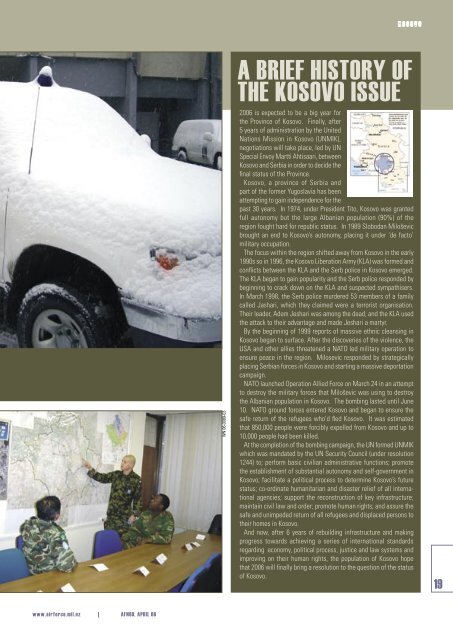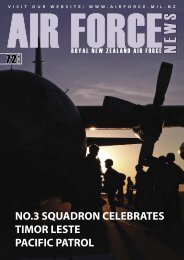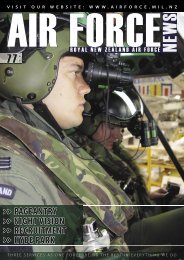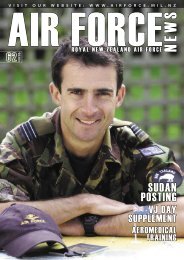BOMBING WEEK - Royal New Zealand Air Force
BOMBING WEEK - Royal New Zealand Air Force
BOMBING WEEK - Royal New Zealand Air Force
You also want an ePaper? Increase the reach of your titles
YUMPU automatically turns print PDFs into web optimized ePapers that Google loves.
www.airforce.mil.nz<br />
AFN69, APRIL 06<br />
WN 06-0089-03<br />
A BRIEF HISTORY OF<br />
THE KOSOVO ISSUE<br />
2006 is expected to be a big year for<br />
the Province of Kosovo. Finally, after<br />
5 years of administration by the United<br />
Nations Mission in Kosovo (UNMIK),<br />
negotiations will take place, led by UN<br />
Special Envoy Martti Ahtisaari, between<br />
Kosovo and Serbia in order to decide the<br />
final status of the Province.<br />
Kosovo, a province of Serbia and<br />
part of the former Yugoslavia has been<br />
attempting to gain independence for the<br />
past 30 years. In 1974, under President Tito, Kosovo was granted<br />
full autonomy but the large Albanian population (90%) of the<br />
region fought hard for republic status. In 1989 Slobodan Miloševic<br />
brought an end to Kosovo’s autonomy, placing it under ‘de facto’<br />
military occupation.<br />
The focus within the region shifted away from Kosovo in the early<br />
1990s so in 1996, the Kosovo Liberation Army (KLA) was formed and<br />
conflicts between the KLA and the Serb police in Kosovo emerged.<br />
The KLA began to gain popularity and the Serb police responded by<br />
beginning to crack down on the KLA and suspected sympathisers.<br />
In March 1998, the Serb police murdered 53 members of a family<br />
called Jashari, which they claimed were a terrorist organisation.<br />
Their leader, Adem Jeshari was among the dead, and the KLA used<br />
the attack to their advantage and made Jeshari a martyr.<br />
By the beginning of 1999 reports of massive ethnic cleansing in<br />
Kosovo began to surface. After the discoveries of the violence, the<br />
USA and other allies threatened a NATO led military operation to<br />
ensure peace in the region. Milosevic responded by strategically<br />
placing Serbian forces in Kosovo and starting a massive deportation<br />
campaign.<br />
NATO launched Operation Allied <strong>Force</strong> on March 24 in an attempt<br />
to destroy the military forces that Miloševic was using to destroy<br />
the Albanian population in Kosovo. The bombing lasted until June<br />
10. NATO ground forces entered Kosovo and began to ensure the<br />
safe return of the refugees who’d fled Kosovo. It was estimated<br />
that 850,000 people were forcibly expelled from Kosovo and up to<br />
10,000 people had been killed.<br />
At the completion of the bombing campaign, the UN formed UNMIK<br />
which was mandated by the UN Security Council (under resolution<br />
1244) to; perform basic civilian administrative functions; promote<br />
the establishment of substantial autonomy and self-government in<br />
Kosovo; facilitate a political process to determine Kosovo’s future<br />
status; co-ordinate humanitarian and disaster relief of all international<br />
agencies; support the reconstruction of key infrastructure;<br />
maintain civil law and order; promote human rights; and assure the<br />
safe and unimpeded return of all refugees and displaced persons to<br />
their homes in Kosovo.<br />
And now, after 6 years of rebuilding infrastructure and making<br />
progress towards achieving a series of international standards<br />
regarding economy, political process, justice and law systems and<br />
improving on their human rights, the population of Kosovo hope<br />
that 2006 will finally bring a resolution to the question of the status<br />
of Kosovo.<br />
19



![February 2007, Issue 78 [pdf 3mb, 44 pages] - Royal New Zealand ...](https://img.yumpu.com/17485296/1/184x260/february-2007-issue-78-pdf-3mb-44-pages-royal-new-zealand-.jpg?quality=85)












